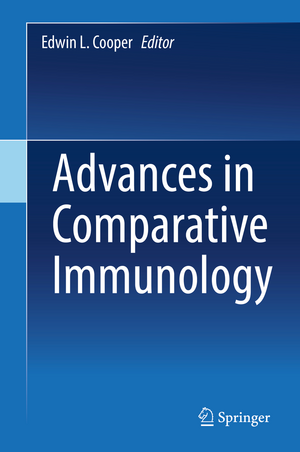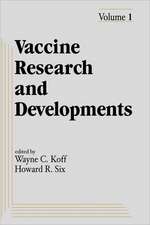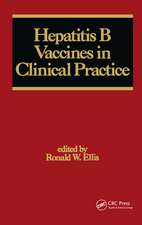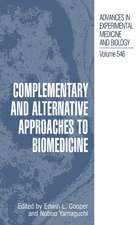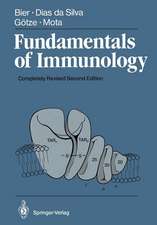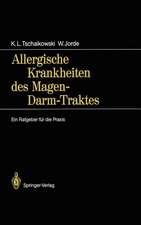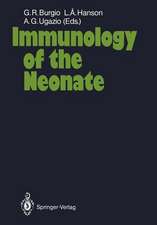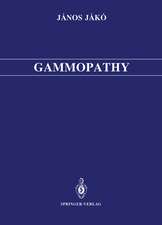Advances in Comparative Immunology
Editat de Edwin L. Cooperen Limba Engleză Hardback – 3 noi 2018
This book aims to fill this void by describing and discussing what is known about non-human immunology. It covers various major animal phyla, its chapters organized in a progression fromthe simplest unicellular organisms to the most complex vertebrates, mammals. Chapters are written by experts, covering the latest findings and new research being conducted about each phylum.
Edwin L. Cooper is a Distinguished Professor in the Laboratory of Comparative Immunology, Department of Neurobiology at UCLA’s David Geffen School of Medicine.
| Toate formatele și edițiile | Preț | Express |
|---|---|---|
| Paperback (1) | 1453.01 lei 43-57 zile | |
| Springer International Publishing – 14 feb 2019 | 1453.01 lei 43-57 zile | |
| Hardback (1) | 1965.58 lei 43-57 zile | |
| Springer International Publishing – 3 noi 2018 | 1965.58 lei 43-57 zile |
Preț: 1965.58 lei
Preț vechi: 2069.04 lei
-5% Nou
Puncte Express: 2948
Preț estimativ în valută:
376.23€ • 408.81$ • 316.24£
376.23€ • 408.81$ • 316.24£
Carte tipărită la comandă
Livrare economică 21 aprilie-05 mai
Preluare comenzi: 021 569.72.76
Specificații
ISBN-13: 9783319767673
ISBN-10: 3319767674
Pagini: 1107
Ilustrații: XL, 1048 p. 204 illus., 174 illus. in color.
Dimensiuni: 155 x 235 x 69 mm
Greutate: 1.69 kg
Ediția:1st ed. 2018
Editura: Springer International Publishing
Colecția Springer
Locul publicării:Cham, Switzerland
ISBN-10: 3319767674
Pagini: 1107
Ilustrații: XL, 1048 p. 204 illus., 174 illus. in color.
Dimensiuni: 155 x 235 x 69 mm
Greutate: 1.69 kg
Ediția:1st ed. 2018
Editura: Springer International Publishing
Colecția Springer
Locul publicării:Cham, Switzerland
Cuprins
Acknowledgements and Reminiscences.- Preface.- Part I. From Prokaryotes to Urochordates.- Introduction: Evolution of Immunity.- Allorecognition and Innate Immunity in the Dictyostelid Social Amoebae.- Cnidarian Immunity: Anthozoans in the Hot Seat.- Molecular Dissection of the Planarian Innate Immune System.- The C. elegans Model for Innate Immunity.- Earthworm Immunity: Quo Vadis? Advances and new Paradigms in the Omics Era.- Recognition of Non-Self in Earthworms.- Immunity in Mollusks: Recognition and Effector Mechanisms with a Focus on Bivalvia.- Molluscan immunobiology: Challenges in the Anthropocene Epoch.- The Complex Immune System in Echinoderms.- Natural Chimerism and Tolerance Induction in a Colonial Chordate.- The Inflammatory Response: The Basic Process of the Ascidians Innate Immunity.- Part II. From Cephalochordates to Vertebrates.- Complex Immunity in Cephalochordates.- The Origin and Early Evolution of Adaptive Immune Systems.- The Immune System of Cartilaginous Fishes.- Immune System of Teleosts.- Humoral Immunity in Reptiles.- Cellular Immunity in Reptiles.- The Immunological Characteristics of Fowls and Ostriches.- Immunology of Bats.- Elephant Immune System.- Comparative Phylogeny of the Nasopharynx-Associated Lymphoid Tissue.- Part III. Future Paths, Climate Change, Environmental Influences, Cancer, Therapy.- An Introduction to Ecoimmunology.- Environmental Interactions and Ecotoxicity in Relation to the Earthworm Immune System.- P53 Protein Family in Molluscan Transmissible Cancer: Lessons Learned.- Global Amphibian Declines Caused by an Emerging Infectious Disease and Inadequate Immune Responses.- Invertebrate Immunology from the Clinician’s Perspective.- Pathogens and Cancer: Clonal Processes and Evolution.
Notă biografică
Edwin L. Cooper is a Distinguished Professor in the Department of Neurobiology at UCLA's David Geffen School of Medicine.
Textul de pe ultima copertă
Immunologists, perhaps understandably, most often concentrate on the human immune system, an anthropocentric focus that has resulted in a dearth of information about the immune function of all other species within the animal kingdom. However, knowledge of animal immune function could help not only to better understand human immunology, but perhaps more importantly, it could help to treat and avoid the blights that affect animals, which consequently affect humans. Take for example the mass death of honeybees in recent years – their demise, resulting in much less pollination, poses a serious threat to numerous crops, and thus the food supply. There is a similar disappearance of frogs internationally, signaling ecological problems, among them fungal infections. This book aims to fill this void by describing and discussing what is known about non-human immunology. It covers various major animal phyla, its chapters organized in a progression from the simplestunicellular organisms to the most complex vertebrates, mammals. Chapters are written by experts, covering the latest findings and new research being conducted about each phylum.
Edwin L. Cooper is a Distinguished Professor in the Laboratory of Comparative Immunology, Department of Neurobiology at UCLA’s David Geffen School of Medicine.
Edwin L. Cooper is a Distinguished Professor in the Laboratory of Comparative Immunology, Department of Neurobiology at UCLA’s David Geffen School of Medicine.
Caracteristici
Unique book on comparative immunology Contributions by experts in the field Discusses the immune system of various major animal phyla
